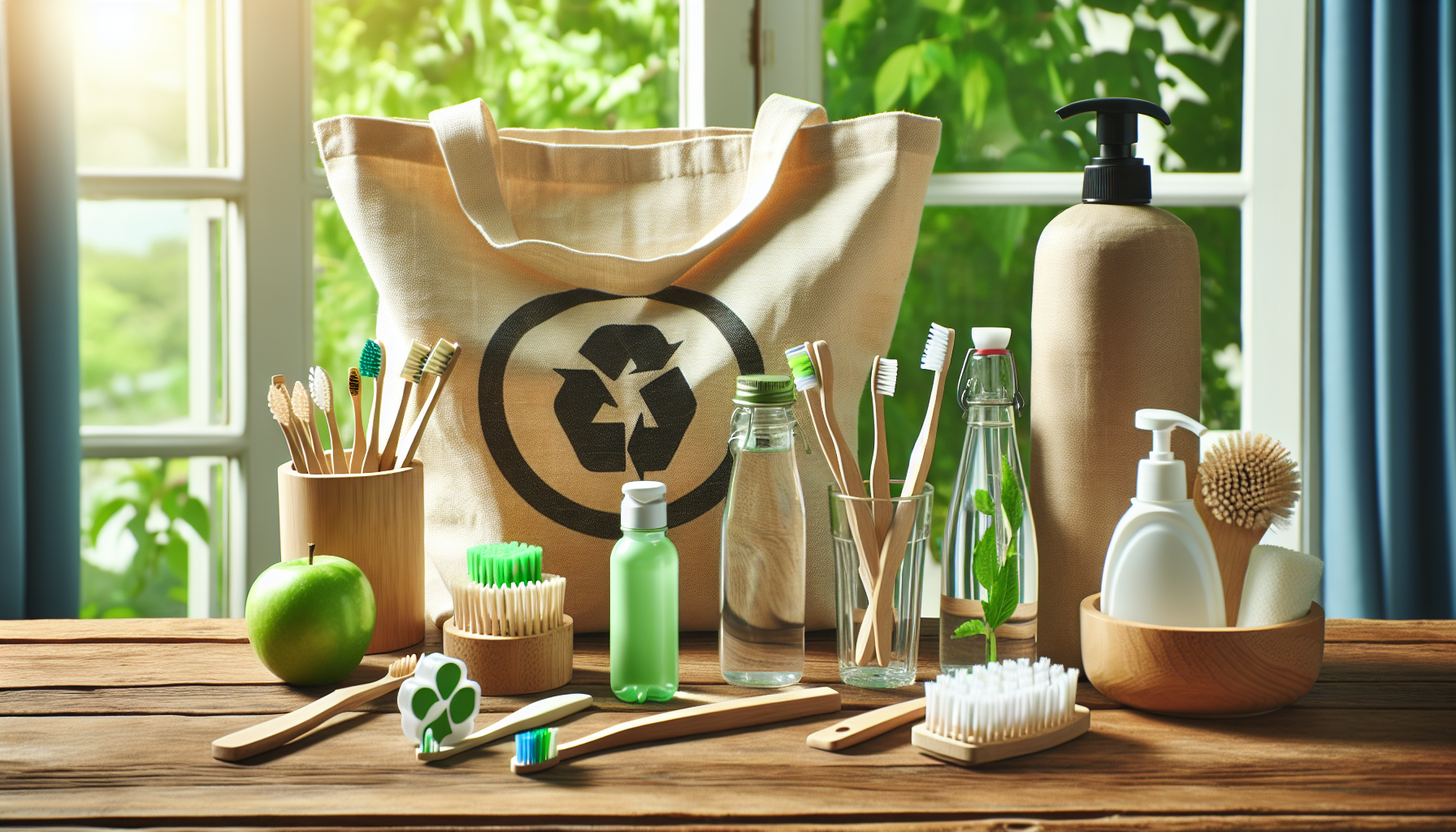Living a sustainable lifestyle is no longer a daunting task with the availability of a wide range of eco-friendly products. From reusable grocery bags to energy-efficient appliances, these products make it effortless for you to reduce your carbon footprint and make a positive impact on the environment. Whether you are a seasoned environmentalist or just starting your journey towards sustainability, incorporating these eco-friendly products into your everyday life is a simple yet effective way to contribute to a greener future.
Introduction
Welcome to a world of sustainable living made easy with eco-friendly products! In this article, we will explore the numerous benefits of embracing a sustainable lifestyle and how eco-friendly products can play a vital role in achieving this goal. From reducing environmental impact to promoting a healthier lifestyle, sustainable living holds the key to a greener and more sustainable future for all. So let’s dive in and discover the wonders of sustainable living!
Benefits of Sustainable Living
Reduction of Environmental Impact
By adopting sustainable living practices and using eco-friendly products, you can significantly reduce your environmental impact. Traditional products often contain harmful chemicals that can pollute the air, water, and soil. On the other hand, eco-friendly products are carefully developed to have minimal negative effects on the environment. By opting for sustainable alternatives, you are actively contributing to the preservation of our planet for future generations.
Conservation of Natural Resources
One of the primary benefits of sustainable living is the conservation of natural resources. Traditional products often rely on the extraction and depletion of finite resources, leading to environmental degradation. On the contrary, eco-friendly products are designed to be resource-efficient, minimizing waste and reducing the overall strain on the environment. By choosing eco-friendly options, you are actively participating in the conservation of precious natural resources.
Promotion of a Healthier Lifestyle
Sustainable living is not just beneficial for the environment; it also promotes a healthier lifestyle for individuals and communities. Many eco-friendly products are crafted with natural and non-toxic ingredients, which not only help protect the environment but also safeguard your health. By embracing sustainable living and using eco-friendly products, you create a safer and healthier living environment for yourself and those around you.

Understanding Eco-Friendly Products
Definition of Eco-Friendly Products
Eco-friendly products, also known as environmentally friendly products, are goods and services that are manufactured and designed to have minimal negative impact on the environment throughout their life cycle. These products are made with sustainable materials, minimize waste generation, and are produced using eco-friendly manufacturing processes. They are designed to address both ecological concerns and human health considerations.
Importance of Eco-Labeling
In order to identify eco-friendly products, it is crucial to look for proper eco-labeling. Eco-labels are certifications or symbols that provide information about the environmental and health attributes of a product. They serve as a guide for consumers, helping them make informed choices and support sustainable practices. By understanding and valuing the importance of eco-labeling, you can easily identify and choose eco-friendly products that align with your sustainable living goals.
Different Types of Eco-Friendly Products
Eco-friendly products can span across various sectors, ranging from personal care and cleaning products to appliances and transportation. Some common examples of eco-friendly products include:
- Organic and natural personal care products
- Biodegradable cleaning products
- Energy-efficient appliances
- Sustainable and locally sourced food options
- Water-saving fixtures
- Renewable energy sources for transportation
Each of these types of eco-friendly products contributes to sustainable living in its own unique way, making it easier for individuals to incorporate sustainability into their everyday lives.
Eco-Friendly Cleaning Products
Advantages of Eco-Friendly Cleaning Products
Using eco-friendly cleaning products offers several advantages. Firstly, they are often made from natural and non-toxic ingredients, reducing the risk of exposure to harmful chemicals for both you and the environment. Secondly, eco-friendly cleaning products are biodegradable, meaning they break down safely and do not contribute to water and soil pollution. Lastly, these products typically come in recyclable or reusable packaging, reducing waste generation.
Common Eco-Friendly Cleaning Ingredients
Eco-friendly cleaning products often utilize natural ingredients that are equally effective in maintaining cleanliness and hygiene. Common ingredients include baking soda, vinegar, lemon juice, and essential oils, which have antimicrobial and disinfecting properties. These ingredients can be used individually or combined to create effective and eco-friendly cleaning solutions that tackle a wide range of cleaning tasks.
Recommended Eco-Friendly Cleaning Brands
When it comes to selecting eco-friendly cleaning products, there is a wide range of reputable brands to choose from. Some recommended brands include Method, Ecover, Seventh Generation, Mrs. Meyer’s, and Attitude. These brands are known for their commitment to sustainability and offer a diverse range of cleaning products that are effective, safe for use, and environmentally friendly.

Energy-Efficient Appliances
Reducing Energy Consumption at Home
Energy-efficient appliances are a crucial aspect of sustainable living as they help reduce energy consumption and lower carbon emissions. By choosing appliances with high energy efficiency ratings, you can significantly decrease your household’s energy consumption. Simple steps such as turning off appliances when not in use, using energy-saving modes, and unplugging electronics when not needed can further contribute to energy conservation.
Benefits of Energy-Efficient Appliances
Energy-efficient appliances offer numerous benefits beyond reducing energy consumption. Firstly, they can help you save money on utility bills by minimizing energy wastage. Secondly, these appliances are often built to last longer, reducing the need for frequent replacements. Lastly, by choosing energy-efficient appliances, you are actively contributing to the reduction of greenhouse gas emissions, mitigating climate change, and preserving the environment.
Top Energy-Efficient Appliance Brands
When searching for energy-efficient appliances, it is essential to look for trusted brands that prioritize sustainability. Some renowned energy-efficient appliance brands include Energy Star, LG, Bosch, Samsung, and Whirlpool. These brands offer a wide range of energy-efficient products such as refrigerators, washing machines, dishwashers, and air conditioners, ensuring that you can make sustainable choices without compromising on performance.
Sustainable Food Choices
Importance of Sustainable Food
Making sustainable food choices is crucial for promoting a greener and healthier future. Sustainable food production focuses on minimizing the use of pesticides, conserving water, reducing greenhouse gas emissions, and preserving biodiversity. By supporting sustainable food practices, you contribute to the protection of ecosystems, promote animal welfare, and ensure food security for generations to come.
Organic and Locally Sourced Options
Choosing organic and locally sourced food options is an excellent way to embrace sustainable living. Organic food is grown without the use of synthetic pesticides and fertilizers, reducing soil and water pollution. Locally sourced food minimizes carbon emissions associated with transportation, supports local farmers, and ensures freshness. Look for organic certifications and visit local farmers’ markets to access a wide variety of sustainable food options.
Eating Less Meat and Choosing Plant-Based Alternatives
Reducing meat consumption and embracing plant-based alternatives is another effective way to promote sustainable living. Livestock farming accounts for significant greenhouse gas emissions and contributes to deforestation and water pollution. By incorporating more plant-based meals into your diet, you reduce the demand for animal products, conserve resources, and promote a healthier eating pattern. Explore the world of plant-based proteins, such as legumes, tofu, and tempeh, to diversify your meals in a sustainable and delicious way.
Water-Saving Solutions
Conserving Water in Daily Activities
Conserving water is an essential aspect of sustainable living. Simple steps such as turning off the tap while brushing your teeth, taking shorter showers, and fixing leaky faucets can make a significant difference in water consumption. Additionally, collecting rainwater for non-potable purposes, such as watering plants, further reduces the strain on freshwater sources and promotes sustainable water management.
Efficient and Eco-Friendly Water Fixtures
Investing in efficient and eco-friendly water fixtures is another effective way to save water. Low-flow faucets, showerheads, and toilets are designed to minimize water usage while maintaining adequate performance. Additionally, installing aerators in faucets and rainwater harvesting systems can further enhance water efficiency. By incorporating these fixtures into your home, you can conserve water without compromising on comfort and convenience.
Innovative Water-Saving Technologies
Innovative water-saving technologies offer exciting solutions for sustainable living. Greywater recycling systems, for example, allow you to reuse water from sources such as showers and dishwashers for irrigation purposes. Smart irrigation systems utilize weather data and soil moisture sensors to optimize watering, minimizing water wastage. These technologies not only promote water conservation but also help reduce water bills and contribute to a more sustainable lifestyle.
Green Transportation
Reducing Carbon Emissions through Transportation
Reducing carbon emissions is a crucial step towards a sustainable future, and transportation plays a significant role in this effort. Opting for greener transportation alternatives such as public transportation, cycling, and walking can significantly reduce your carbon footprint. By minimizing the use of personal vehicles and choosing shared modes of transportation, you contribute to improved air quality, reduced traffic congestion, and a healthier environment.
Benefits of Electric and Hybrid Vehicles
Electric and hybrid vehicles are another excellent option for green transportation. These vehicles produce little to no tailpipe emissions, significantly reducing greenhouse gas emissions and air pollution. With advancements in technology, electric vehicles have become more accessible and offer longer driving ranges. By transitioning to electric or hybrid vehicles, you not only contribute to a cleaner environment but can also enjoy long-term cost savings on fuel and maintenance.
Promotion of Public Transportation and Cycling
Promoting public transportation and cycling is an integral part of sustainable living. Utilizing public transportation systems reduces the number of individual vehicles on the road, easing traffic congestion and reducing emissions. Cycling provides a zero-emission mode of transportation, offering health benefits and contributing to improved air quality. By embracing these greener methods of travel, you not only reduce your ecological impact but also contribute to creating more sustainable and livable cities.
Reusable and Biodegradable Products
Limiting Single-Use Items
Single-use items contribute significantly to waste generation and environmental pollution. By limiting the use of disposable items such as plastic bags, bottles, and straws, you can make a positive impact on the environment. Instead, opt for reusable alternatives such as cloth bags, stainless steel water bottles, and bamboo straws. By incorporating reusable products into your daily life, you help reduce waste, conserve resources, and prevent marine pollution.
Advantages of Reusable Products
Reusable products come with several advantages that go beyond waste reduction. Firstly, they are more cost-effective in the long run, as you save money by not repurchasing disposable items frequently. Secondly, reusable products are often made from sustainable materials such as bamboo, stainless steel, or glass, reducing reliance on plastic and promoting resource conservation. By embracing reusable products, you can enjoy the benefits of convenience while making a positive impact on the environment.
Biodegradable Alternatives
Biodegradable alternatives offer a sustainable solution to the problem of single-use products. Biodegradable materials break down naturally in the environment, minimizing their impact on ecosystems. Products such as biodegradable cutlery, plates, and packaging made from materials like plant-based plastics or compostable materials offer a more sustainable approach to disposable items. By choosing biodegradable alternatives, you can help reduce waste and create a healthier planet.
Green Living Tips and Resources
Creating a Sustainable Home
Creating a sustainable home is an exciting journey and involves making conscious choices in various aspects of your daily life. Consider implementing energy-efficient upgrades, such as installing LED light bulbs, insulating your home, and using smart thermostats. Reduce water consumption by fixing leaks, installing efficient fixtures, and incorporating rainwater harvesting systems. Embrace recycling and composting practices to minimize waste. By adopting these practices, you can transform your home into a sustainable haven.
Educational Resources for Sustainable Living
Educating yourself about sustainable living is crucial for making informed choices. Several resources are available to help you expand your knowledge and understanding of sustainable practices. Books, documentaries, and online platforms offer valuable insights and practical tips. Look for titles such as “The Sustainable Home” by Christine Liu, “No Impact Man” by Colin Beavan, and documentaries like “An Inconvenient Truth” and “Cowspiracy” to deepen your understanding of sustainability and inspire positive change.
Joining Sustainable Living Communities
Joining sustainable living communities is an excellent way to connect with like-minded individuals and learn from their experiences. These communities, whether local or online, offer a platform for sharing ideas, resources, and support. Participate in local sustainability events, workshops, and seminars to network with individuals who are passionate about sustainable living. By joining these communities, you can gain valuable insights, find inspiration, and collectively work towards a greener future.
Conclusion
Congratulations on completing this comprehensive article on sustainable living made easy with eco-friendly products! We have explored the benefits of sustainable living, the importance of eco-friendly products, and various ways to incorporate sustainable choices into different aspects of your life. By embracing sustainable practices, choosing eco-friendly options, and making conscious decisions, you can contribute to a greener, healthier, and more sustainable future for yourself and the planet. Remember, every small step towards sustainability counts, so let’s embark on this exciting journey together!

